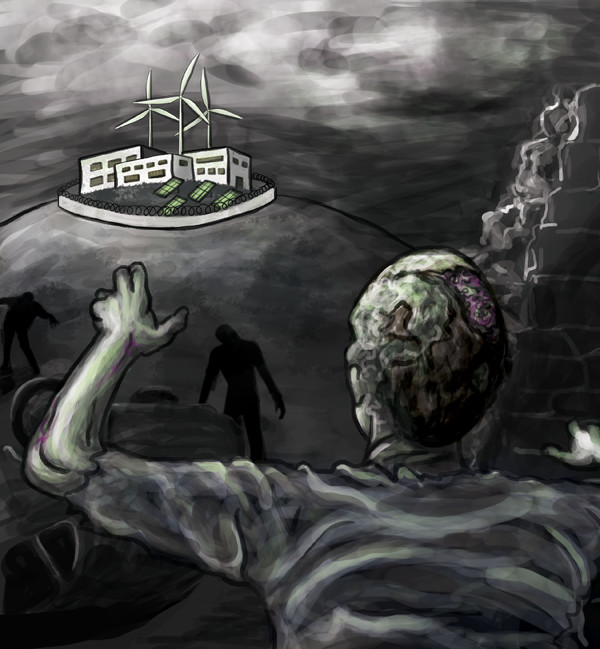
by Michael E. Webber Wednesday, November 20, 2013

Kathleen Cantner, AGI
Editor's Note: Traditionally, EARTH has published a "highlights" or "year in review" issue at the end of the year. This year, we decided to try a new approach: We asked our staff and some frequent contributors to write a short commentary on something that grabbed their attention in 2013. We gave everyone carte blanche. What follows is a collection of extremely varied, often very personal insights into how the planet impacted each individual. You can find some online this month, but for the full grouping, you'll have to buy the issue here or subscribe.
Spoiler alert: If you haven’t read or watched “World War Z,” but you intend to, note that this column contains spoilers.
What can we learn from people who have survived a zombie invasion? A lot, if you follow the book (and movie) “World War Z” to a logical conclusion. Although the book and the movie are very different from each other — they share the same title and topic (zombies), but that’s about it — energy and climate change issues weave in and out of both stories.
The book is presented as an after-the-fact oral history that reveals some key elements of a supposed war waged by humans against a zombie invasion. Although humans were ultimately successful, victory was achieved at great cost. Nominally about the rise of the undead, “World War Z” includes gripping details about how the zombie infestation spread, the terror it induced, and the lengths to which people went to survive.
While the zombie element is fun, the book ends up being a serious critique of modern civilization’s inability to swiftly and firmly deal with a major global crisis that puts the fate of societies at risk. In that way, it reminds me of how we’re dealing with climate change. Or, rather, how we’re not dealing with climate change. In fact, the movie captures this stark similarity in the very opening scene, where the narrators (in the form of news anchors) discuss the threat of climate change interspersed with breaking updates about the “rabies” outbreak that is later revealed to be the zombie attacks.
In the story, the governments of the world pretend nothing is wrong so as not to worry the populace. The markets sell snake-oil solutions, profiting off fear while giving the governments and people a false sense of security. Because of the delays in responding, the problem grows worse than expected and harder to solve, taking a significant toll on human life and prosperity along the way.
The fictional zombie invasion in “World War Z” can be interpreted as a symbolic stand-in for real-life climate change. In fact, while reading the book, I couldn’t help but replace the words “zombie invasion” with “climate change,” “pandemic,” “global economic collapse,” and any of a number of other multi-continent crises. The story line would be largely the same: failure to recognize the global threat for what it is, profit-seeking industrialists who confuse real solutions with self-serving falsities, acting too late, failure to adjust our approach because of a short-sighted sense that things surely aren’t all that bad, and then wondering how it all went wrong. Hopefully that’s not the path we will take with climate change.
The connections don’t end there. The story is laced with details of energy concerns that are analogous to real life in some surprising and some not surprising ways. Notably, energy systems are the indicators of death or survival: The cities that collapsed had lost their central power grids, and the cities that survived were able to protect their energy systems. The story subtly but repeatedly notes that survivors used independent, off-the-grid energy systems fueled by biomass or solar energy. The centralized systems that depended on fossil fuels, large power plants, transmission lines, refineries and pipelines failed.
Whether consciously or not, the author is reminding us that the self-reliance ethic that has been central in more than two centuries of American philosophy is compatible with small, distributed, renewable energy systems rather than large, centralized, fossil-fueled systems. He seems to be saying that the key to survival against zombies or climate change is the marriage between two extremes of modern American political thought: survivalists with an off-the-grid mentality, who want democratized and locally controlled energy systems, and environmentalists who want renewable and low-carbon options. Technologists get tossed a bone too, as a small nuclear system embedded in a submarine makes a cameo as the savior for one community, giving them electricity and clean water.
Bringing the whole climate change analogy full circle, the zombie infestation actually causes climate change in the world of “World War Z,” and one of the survival methods is to move toward the poles. It turns out that zombies freeze in the cold, so moving to cooler climates proves the best option for adaptation to the new reality. Survivors set up refugee camps and “free zones” (meaning zones that are free of zombies) in Nova Scotia, for example. Simply moving toward the poles instead of doing the hard work to prevent the problem from growing in the first place is the preferred option. Hmm. This sounds eerily familiar, as some policymakers are suggesting we simply move to colder climates instead of mitigating greenhouse gas emissions.
[]{#Find web stories}In reality, I hate to think that we would need to turn to a book about a fictional zombie war for guidance on climate policy. Then again, it may hold some valuable insights for us, considering how little we’ve been doing for the last few decades.
© 2008-2021. All rights reserved. Any copying, redistribution or retransmission of any of the contents of this service without the expressed written permission of the American Geosciences Institute is expressly prohibited. Click here for all copyright requests.